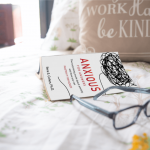We have many ways of trying to manage and ease our anxiety in the moment; but the reality is that most of them don’t do much to resolve the real source of our anxiety. When we engage in certain behaviors to relax ourselves, we don’t tend to realize that our actions aren’t just a way of releasing tension, they’re also a means of easing our chronic anxiety. The ways we exhibit anxiety, and the ways we choose to ease it, are reflective of our family of origin and of what has worked best for us to manage our anxiety in the short-term. Anxiety binders might seem like a helpful way to relieve anxiety, but they actually only serve to keep anxiety alive. To bind something is to tie it so it can’t move or escape. This is the purpose anxiety binders serve. Though they might seem to ease our anxiety, they merely keep us tied to the very anxiety and behaviors we want to change.
It’s no surprise that a common way we ease our anxiety in the moment is with drugs and relationships. I think most of us are aware that people use alcohol and legal or illegal drugs—yes, this includes marijuana!—as a means of binding their anxiety. Anxiety binders rob us of our ability to learn how to properly manage our emotions in stressful situations. In this way, they keep our emotional maturity frozen in time. How will we be able to stand on our own two feet if we can’t keep it together, without reaching for something to soothe us like a pacifier? No wonder we’re so damn anxious. We can’t rely on ourselves to keep it together when shit hits the fan!
Below are some additional anxiety binders that you might find surprising:
- Eating Disorders. These can take many forms, such as overeating, bulimia, and anorexia. They serve as both expressions of anxiety and binders of anxiety.
- Overachieving. This can take the form of perfectionism or people-pleasing. Overachieving people are approval seekers; they bind their anxiety through their success and others’ acceptance of them.
- Underachieving. People who underachieve are just as relationship-dependent as overachievers; they might bind their anxiety by bringing in others to solve their issues for them, or by not putting any effort into anything.
- Focusing on Physical Health and Symptoms. People who maintain a preoccupation with their health and physical symptoms manage their emotions around a chronic problem by placing all of their attention on their health issues.
- Hoarding and Overspending. Some people bind their anxiety by hoarding items they don’t need. They might get highly anxious when letting things go, so they hold onto them while accumulating more items. Other people attempt to manage their anxiety by indulging an impulse to spend and buy things they don’t need or can’t afford.
- Gambling. Like all anxiety binders, gambling offers a way to escape or contain anxious feelings. People who gamble compulsively as a way of managing their anxiety become consumed and preoccupied with something other than their anxious feelings.
- Personality Traits. Traits such as obsessiveness, workaholism, shyness, indecisiveness, defensiveness, grandiosity, optimism, and pessimism can also be ways that we bind our anxiety. For example, overly pessimistic people can actually improve their sense of wellbeing by lowering their expectations and always assuming the worst. An overly optimistic person might ease their anxiety around difficult issues by constantly being super positive about situations. This can be a way for a person to avoid their problems, by continuing to be optimistic even about bad situations.
- Avoiding. Many people attempt to contain their anxiety by trying to ignore or dissmissing things they should be doing, such as going to the doctor or paying necessary bills.
- Blaming. Most of us are guilty of attempting to manage our anxiety by blaming others for our problems. This helps us avoid feeling the anxiety that comes with owning our faults and being accountable for our actions. Some people do the opposite of this by taking on most of the blame; if it’s all their fault, they don’t have to deal with displeasing others and holding them accountable.
- Attacking. Attacking others is a way of shifting anxiety onto another person. People who bind anxiety this way displace their anxious feelings onto someone else, giving themselves a sense of relief.
- Fixing and Getting Overly Involved. Many people can be counted on to jump in and fix everything and everyone. When they do this, they’re often acting from a place of anxiety, involving themselves in problems that aren’t theirs, and trying to smooth things over so they won’t have to feel uncomfortable.
The list I shared includes just some of the more common ways we bind our anxiety. But, if we observe ourselves, other people, and our surroundings, we can find many more ways that we ease, contain, and express our anxiety in the moment. My latest book, “Anxious for Answers” can help overcome this, and explains many more ways that we bind our anxiety that can seem like it’s the main issue when it isn’t.
If you would like to learn how to overcome using your anxiety binders as a crutch, check out my new book, “Anxious for Answer.”
Paperback – https://amzn.to/2ZFxQka
Kindle – https://amzn.to/2zveEei
Already started reading it? I would love to hear your thoughts in a sentence or two in an Amazon review
Did you enjoy reading this article?
Once a week I send out a newsletter with new articles and unique content for readers. It is my way of staying in touch with you and giving you free advice based on some important topics.
Click here to sign up for my newsletter.
Talk soon,
Dr. Ilene





